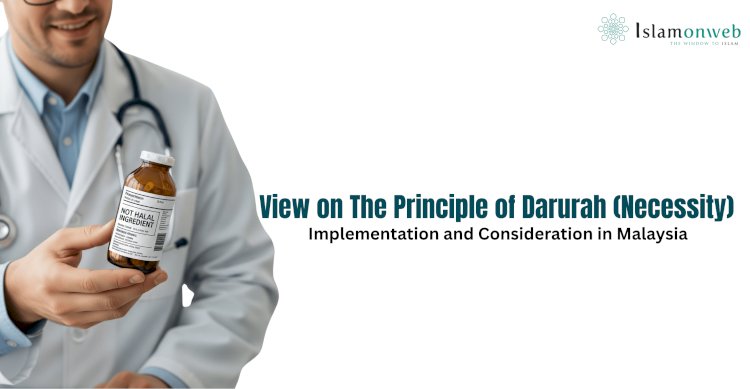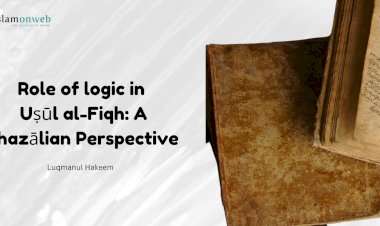View on The Principle of Darurah (Necessity): Implementation and Consideration in Malaysia
Islam is a religion that demonstrates flexibility in addressing contemporary issues, especially related to Islamic ruling. In the Malaysia context, the principle of darurah (meaning: necessity) is not merely a theory confined to academic discussion, it frequently happens in daily life. From medical treatment involving non-halal ingredients in medicine to legal decisions during national crises. The application of darurah shows how Islamic law responds to real human needs. A lot of questions come to mind. Is it permissible to consume non-halal medicine to save life? During pandemic, can Islamic rulings be temporarily suspended during public emergencies? All these questions are not abstract questions, but they are realities faced by Malaysians every day. All the positions involved in this principle such as doctors, patients, scholars, policymakers, bankers and more. How is the principle of darurah understood and implemented in Malaysia, and what is the jurisprudential guide to ensure it is not misused? The concept of darurah (necessity) offers a potential solution by permitting exceptions in extreme circumstances.
The concept of Necessity (Darurah in Islamic Law)
According to Ibnu Manzur, darurah Refers to a situation where a person needs something due to urgent circumstances. The classical scholar such as Imam Nawawi and contemporary scholars such as Dr Wahbah Azzuhaili highlights the concept of darurah in context where life is at risk if there is no alternative but to resort to something prohibited.
In the context of Shariah, Ibn Manzur mentions several similar definitions among scholars, such as:
- Darurah refers to a situation where a person must consume something prohibited or face death, thus making it permissible to consume the haram.
- Another interpretation is the fear of danger to oneself or part of the body if one does not eat, and the meaning is similar.
Dr Wahbah Al-Zuhaili defines the meaning of darurah as a situation where someone faces severe difficulties or danger, to the point where harm to oneself, anbidy part, intellect, or property is feared. In such case, it becomes obligatory or permissible to commit a prohibited (harm) act, delay an obligation, or forgot it alto to prevent the potential harm based on the most likely probability with the condition set by Shariah.
Conceptual Framework of Darurah in Islamic Jurisprudence
The principle of darurah is rooted in both the Quran and the Sunnah:
From the Quran, Allah Taala said: "But if one is forced by necessity without willful disobedience nor transgressing due limits—then there is no sin on him.” (Surah Al-Baqarah, 2:173). Classical scholars such as Al-Shatibi, Al-Ghazali and Ibnu Qudamah contributed significantly to the theorization of darurah, and it linked with Maqasid Shariah (objective of Shariah), especially the preservation of life.
Regarding the verse above, there are conditions of darurah according to classical jurists, firstly, the necessity must be real and present. Secondly, the prohibited matter must be the only way to prevent harm. Thirdly, the extent of relaxation must be proportional and temporary, lastly, the principle cannot be used to justify permanent disobedience.
According to Imam Al-Ghazali, the concept of darurah is based on five essential needs and two important principles:
الضرورات تبيح المحظورات
Meaning: Necessity permits the forbidden.
الضرورة تنزل منزلة الحاجة عامة كانت أو خاصة
Meaning: Necessity is considered equivalent to general and specific need.
The sentence above establishes permission on the condition that a person in a state of darurah does not exceed the limits and does not clarify the cause of the emergency, as well as the meaning of ‘exceeding one’s right.
The Principle of Darurah and its Limits
According to Ibn Qudamah, scholars agree that consuming carrion is prohibited in a voluntary situation, but they also agree that it is permis in cases of darurah. The extents of the darurah are based in the combination of the follo verses of the Quran:
“And He has explained to you in detail what is forbidden to you, except under compulsion of necessity (Al-An’am: 119)
“But whoever is compelled by extreme hunger with no inclination to sin-then indeed, Allah is Forgiving and Merciful” (Surah Al-Maidah: 3)
The Prophet Muhammad (peace be upon him) said: “Indeed Allah has pardoned for my Ummah mistakes, forgetfulness, and what they are forced to do under compulsion.” (Sunan Ibn Majah, Sahih)
This verse and evidence indicate that permission is granted when the need arises. Allah Taala said in the Holy Qur’an:
فَمَنِ اضْطُرَّ غَيْرَ بَاغِ وَلَا عَادٍ فَلَا إِثْمَ عَلَيْهِ إِنَّ اللَّهَ غَفُورٌ رَّحِيمُ
Meanings: “But whoever is forced by necessity, neither desiring (it) nor transgressing (its limits) - there is no sin upon him.” (Al-Baqarah: 173)
The sentence above explains the established permission on the condition that a person in a state of darurah does not exceed the limits and does not clarify the cause of the emergency, as well as the meaning of ‘exceeding the limits’ and ‘exceeding one’s right.’ As previously explained, the method used in various fiqh situations to provide leniency in necessary circumstances is:
ٱلضَّرُورَةُ تُنَزَّلُ مَنْزِلَةَ ٱلْحَاجَةِ عَامَّةً كَانَتْ أَوْ خَاصَّةً
Meanings: “Necessity is considered equivalent to a general or specific need.”
This statement refers to the principle that darurah (urgent circumstances) can be regarded as equivalent to a need whether that need is general or specific.
Application of Darurah in Malaysia Context
Malaysia practices a dual legal system, which is civil law and Shariah law. Although Islamic law is subordinate to the Federal Constitution, Shariah enactments in each state provide for the consideration of darurah, especially in matters related to personal law, criminal law and fatwa issues.
Fatwa institutions in Malaysia often invoke the principle of darurah tomissue rulings that address current needs.
For example, regarding public health and Covid-19. During the Covid-19 pandemic, the National Fatwa Council applied darurah to justify suspensions of Friday congregational prayers and compulsory vaccination, even if their halal status was unclear. This decision prioritized preserving life (hifz al-nafs), a key objective. Furthermore, the attire of female security officers. In limited circumstances, female officers required to wear uniforms that do not fully comply with Islamic dress codes may be excused due to security and operational necessity. This is accepted temporarily and strictly within the bounds of darurah. Moreover, during pandemic, alcohol-based hand sanitizers became essential. Ethanol is normally considered impure; however, sanitizer use was publicly mandate and scientifically proven to prevent disease. Scholars allowed it used under “Umum Blawa” due to difficulty of avoiding alcohol-based product during national crisis.
ʿUmūm al-Balwā means “widespread affliction” or unavoidable public hardship. It is a legal concept in Islamic jurisprudence used when a hardship affects a large group of people, is difficult or impossible to avoid, and if enforcing the strict rule of law in that context would cause undue hardship. It is not exactly the same as darurah (necessity) but is closely related — and may sometimes lead to similar outcomes: permissibility of the impermissible in limited circumstances.
Conclusion
The concept of darurah in Islamic Jurisprudence provides a critical framework for addressing situations where life or severe harm is at risk allowing for exceptions to certain prohibitions in dire circumstances. The darurah principles is grounded in both classical and contemporary jurists (fuqaha) such as Imam Al-Ghazali, Dr Wahbah Zuhaili and Ibn Qudamah agreeing that under necessity, certain forbidden acts may become permissible to protect essential human interests such as life, intellectual and property. The application of darurah extends to medical practice, contract property (muamalat), and other. The use of substances or prohibited treatment in life-threatening conditions provided that no halal alternatives exist. This legal principle reinforced by Quranic verses and hadith emphasised the balance between adhering to shariah and accommodating urgent needs allowing for flexibility while maintaining respect for Islamic Law’s ethical boundaries.
Authors:
- Nazihah Ismail,
- Adilah Amran,
- Ainul Mursyidah Khairul Azhar
About authors: Nazihah Ismail, Adilah Amran, and Ainul Mursyidah Khairul Azhar are pursuing their bachelor's degree in Islamic Revealed Knowledge and Heritage (Fiqh and Usul al-Fiqh) at AHAS, KIRKHS, in the International Islamic University Malaysia.
[As part of Synergised Academic and Student Activities, this article was prepared for the course RKFQ 4315, Qadaya Fiqhiyyah Mu’asirah: Contemporary Juristic Issues at AHAS KIRKHS, IIUM (Sem 2, 2024-2025]
References
Az-Zuhaily, Dr Wahbah, (1984), Al Fiqh Al Islami Wa Adillatuhu, Dar Al Fikr
Syria.
Al-Suyuti, Abu Al Fadl Abdul Rahman (2013), Al-Asybah Wa Al-Nazair Fi Qawaid Wa Furu’ Fiqh Al-Syafi’iya, Dar Al-Hadith, Egypt.
Al-Luhaimid and S. M, (2012) Durus Fiqhiyyah: Al-Fiqh Al-Kamil, Riyad Muttaqin-Saudi.
Al Ghazali, Abu Hamid Muhammad (1993) Al-Mustafa, Dar Al-Kutub, Beirut-Lebanon
Al-Shatibi, Ibrahim Musa and Al-Shirazi, Abu Ishaq Ibrahim, (1997) Al-Muwafaqat fi Usul al-Shariah, Dar Ibn ’Affan.
Husna A., Azhar A. R., and Zain, (2020) The Concept of Necessity (Darurah) in Islamic Law and Its Implication in The Use of Blood Plasma in Medicine, International Journal of Academic Research in Business and Social Sciences, vol 14, issue 10.
Ibn Qudamah, Muhammad Abdullah (1992) Al-Mughni, Dar Al-Fikr.
Disclaimer
The views expressed in this article are the author’s own and do not necessarily mirror Islamonweb’s editorial stance.
























Leave A Comment